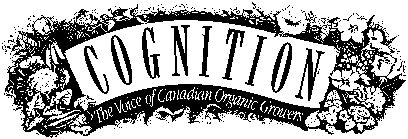

Cognition Index | Virtual Library
| Magazine Rack
Search
| Join the Ecological Solutions Roundtable
COG Organic Field Crop Handbook
1. Principles of Organic Farming
Organic agriculture is a system of farming based on ecological principles -- hence the terms biological or ecological farming which are also used to describe this production method. The goal of organic agriculture is to create a sustainable agriculture system. Many believe it is potentially more environmentally-sustainable and economically-viable than other systems of farming. Organic farmers use many traditional techniques but they also have access to and use new technologies and information from the developing fields of ecology, microbiology and related sciences. Thus there is nothing old-fashioned about organic agriculture; it is the branch of agriculture in which some of the newest developments in food production are occurring.
Because organic farming systems are complex, they defy a simple definition. The following description is adapted from the Consumer and Corporate Affairs Canada "Guide for Food Manufacturers and Advertisers". The CCAC definition is reprinted in full in Appendix B.
Organic farming seeks to create ecosystems that achieve sustainable productivity and provide weed and pest control, through a diverse mix of mutually-dependent life forms, through recycling of plant and animal residues and through crop selection and rotation, water management, tillage and cultivation. Soil fertility is maintained and enhanced by a system which optimizes soil biological activity as the means to provide nutrients for plant and animal life as well as to conserve soil resources.
Organic farmers attempt to incorporate the laws of natural ecosystems into both the farm design and their approach to problem solving. Three principles are described here to illustrate how an organic farm functions within an ecological framework.
1. The principle of interdependency
The most important principle that underlies organic agriculture was stated simply by the German scientist and poet Johann Wolfgang von Goethe. "In living nature nothing happens which is unconnected to the whole." We are just beginning to understand the extent of this interconnectedness. For example, only recently have scientists discovered the extent to which global climate is regulated by an intricate web of mutually-dependent life forms, of which humans are a part.
The organic farmer regards the farm unit as an ecosystem and recognizes that a change to one part of the system may upset the many complex interrelationships that exist within the unit, which in turn can have repercussions beyond the farm boundaries. For example, high nitrogen levels in the soil often stimulates heavy weed growth and can contaminate the groundwater with nitrates. The organic farmer addresses the problem by planting a crop that will utilize the nitrogen, preventing it from leaching into the groundwater and creating a more normal balance of soil nutrients.
2. The principle of diversity
Natural ecosystems have a diverse, intricate web of life that establishes checks and balances which suppress outbreaks of pest species.
Organic farmers are aware that, because of labor requirements and resource limitations, it is not practical to copy the diversity of a natural system. They achieve a compromise by using complex rotations with a variety of crops, by maintaining natural habitats on the farm, and by limiting livestock numbers so that the balance between crops and livestock is maintained. The diversity of crops and livestock gives the organic farmer flexibility and a diverse income (for example, if conditions one year are unfavorable for one crop, another crop or livestock operation will usually do well). The diversity also creates an ecosystem that has biological checks and balances that help prevent any one species of insect, weed or disease from becoming a problem.
[photo 0.1 Natural habitats are an important part of an organic farm]
3. The principle of recycling
Natural ecosystems are characterized by a continual growth, decay and recycling of nutrients. Through the process of photosynthesis, the primary producers -- the green plants -- use solar energy to convert carbon dioxide, water and soil nutrients into carbohydrates and proteins. Plants are eaten by herbivores and insects, which are in turn consumed by carnivores or predators. The nutrients that have been incorporated into the bodies of these organisms will be recycled by the actions of the decomposers -- the bacteria, actinomycetes and fungi -- most of which operate in the upper layers of the soil.
The organic farm cannot entirely duplicate the natural ecosystem, but the organic farmer uses the natural system as a model and works towards self-sufficiency on the farm by recycling the nutrients on the farm. Plant and animal residues are returned to the soil to help build biological fertility, thereby minimizing the quantity of soil amendments that must be purchased.
Finally, and central to the principles of organic farming, is the concept that the productivity of the farm starts with the soil. A well-balanced and biologically-active soil will provide the crop with sufficient nutrients for optimum growth and yields, with a minimum of pest and disease problems.
Further reading
Altieri, Miguel, Agroecology: The Scientific Basis of Alternative Agriculture, 2nd ed., Boulder, CO, Westview Press, 1987, 160 pp.Hanley, P., ed., Earthcare: Ecological Agriculture in Saskatchewan, Earthcare Group, Wynward, Sask., 1980, 236 pp.
Hill, Stuart B., Towards an Alternative Agriculture, 1976, Ecological Agriculture Project, MacDonald College, Que.
Hodges R.D., Who needs inorganic fertilizers anyway? The case for Biological Agriculture, Inst. of Biological Husbandry, Suffolk, England, 1978, 24 pp.
Lampkin, Nicolas, Organic Farming, Farming Press, Ipswich, U.K., 1990, 701 pp.
Odum, E.P., Fundamentals of Ecology, 2nd ed., Philadelphia, PA, Saunders, 1959, 546 pp.
Copyright © 1992 Canadian Organic Growers. Inc
Info Request | Publication List